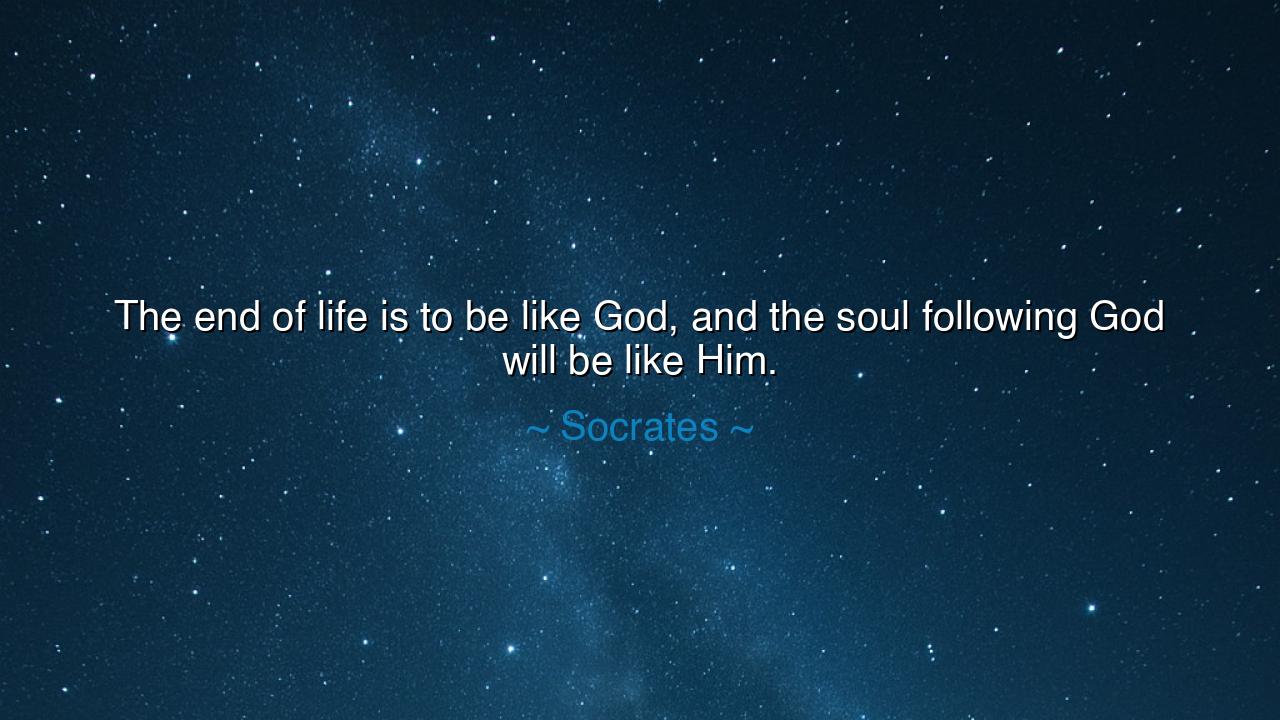
The end of life is to be like God, and the soul following God






“The end of life is to be like God, and the soul following God will be like Him.” — Thus spoke Socrates, the wisest of the Athenians, whose mind shone with the fire of divine reason. These words, though simple, carry the weight of eternity. They are not the speech of a man dreaming of power or glory, but the vision of a soul that has glimpsed the sacred purpose of human existence. In this saying, Socrates teaches that the true aim — the end of life — is not wealth, nor fame, nor even knowledge for its own sake, but the imitation of the divine, the shaping of the soul until it reflects the goodness, wisdom, and harmony of God Himself.
In the ancient world, this idea stood as the highest summit of philosophy. To be like God did not mean to claim His throne, but to mirror His virtues. It meant to purify one’s heart of ignorance and malice, to cultivate justice, courage, and self-restraint — to rise above the murk of desire and dwell in the light of truth. Socrates, who saw the gods not as mythic beings bound to Olympus, but as symbols of eternal truth and goodness, taught that divinity begins within the soul. When a man acts with reason, lives with virtue, and seeks truth above all else, he participates in the divine nature. To follow God, then, is to follow truth — and in so doing, to become godlike in spirit, though still mortal in flesh.
The origin of this teaching lies deep in the dialogue of the Platonic tradition, where Socrates, as recorded by Plato, speaks often of the soul’s journey toward perfection. He believed that every soul carries within it a divine spark, a reflection of the eternal. Yet this spark is clouded by the passions of the body — by anger, lust, greed, and fear. The philosopher’s task, he said, is to cleanse the soul through contemplation and virtue, until it shines again with its original light. “To know the good,” he declared, “is to do the good.” And when a soul lives according to this knowledge, it grows more like the divine Goodness from which all things flow.
In his own life, Socrates embodied this truth. When he was condemned to death by his city — not for crime, but for questioning men’s pretensions to wisdom — he met his fate without bitterness. He drank the poison calmly, as one passing from shadow into light. For he believed that death could not harm the soul that follows God. The body may perish, but the divine within us — the part that loves truth and virtue — endures. In that moment, Socrates showed his disciples that to live and die in harmony with reason and goodness is to dwell already in the company of the divine. His death was not an end, but a completion — the fulfillment of his teaching: that the soul following God will be like Him.
Throughout history, this truth has appeared again and again, in prophets and poets, saints and seekers. The Christian apostle Paul would later echo Socrates’ insight when he wrote, “Be imitators of God, as dearly beloved children.” The Indian sages spoke likewise, teaching that the highest goal of life is union with the Divine, when the drop realizes itself as part of the ocean. Whether in Athens, Jerusalem, or the banks of the Ganges, the message is one: that the human soul was made not merely to survive, but to ascend, to grow ever closer to the perfection from which it came.
Consider the story of Saint Francis of Assisi, who renounced wealth and comfort to live a life of purity, service, and compassion. In his gentleness toward all living things, in his joy amid poverty, he reflected something greater than himself — the quiet majesty of the divine. He became, as Socrates would say, “like God” — not in power, but in love and simplicity, proving that holiness is not reserved for gods or kings, but lies open to any soul that follows the path of goodness.
From this teaching, let us draw a lesson for our own age. To follow God is not merely to pray or profess faith; it is to live with integrity, to seek truth, and to act with kindness when cruelty is easy. It is to rise each day with the intent to make the soul clearer, nobler, and more just — to turn from envy, greed, and fear, and to dwell in compassion, wisdom, and peace. The divine is not distant; it is the voice that whispers within when we choose what is right over what is easy. Each act of love, each moment of truth, is a step toward godlikeness.
So, my children, remember the wisdom of Socrates: that the purpose of life is not to amass riches or chase pleasures, but to become worthy of the divine breath within you. The end of life is not death, but transformation — the slow unfolding of the eternal in mortal form. Strive, then, to follow the path of the good, to walk in harmony with the truth, and your soul, brightened by virtue, will reflect the light of God Himself. For to live in this way is to fulfill the sacred destiny of man — to be like God, and in so doing, to know true immortality.






AAdministratorAdministrator
Welcome, honored guests. Please leave a comment, we will respond soon